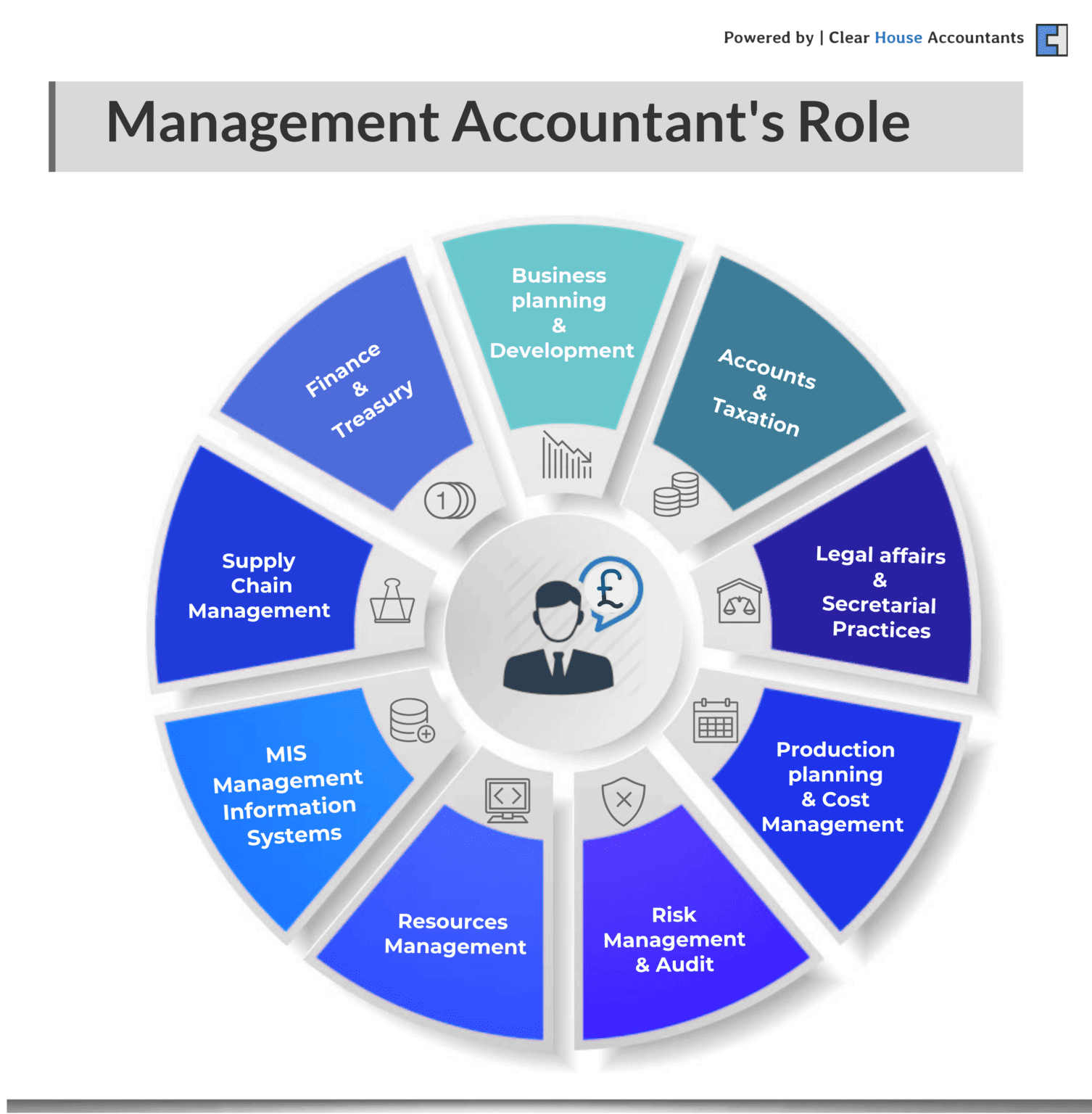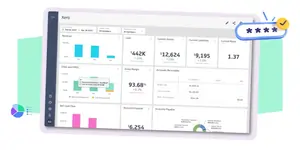Picture yourself sitting at your desk with bills, invoices, and other financial documents surrounding you. There is the soft clack of calculator buttons being pressed with a mix of the tapping sounds of the keyboard keys being clicked every now and then.
You skim through this vast mountain of documents for discrepancies, patterns, and insights. Your job? You’re more than simply a number cruncher; you’re an accountant, a true expert in the world of Business.
Accountants are the unsung heroes who work their magic behind the scenes in the exciting business world, where pounds and pence reign supreme.
They are the keepers of financial sanity, ensuring the economy runs smoothly from the busy streets of London to the quiet countryside. However, accountants are much more than simply number people; they are also artists who provide a clear image of a business’s financial standing and future prospects.
There are many questions people have about accountants. Some of these queries include: What does an accountant do? How can I become one? Where do I find one? And what is the role of an accountant in business? This report analyses and addresses most of your queries, whether you’re a student, a company, a business, or a career seeker wanting to become an accountant.
Free Accounting Resources
What is Accounting?
The roots of accounting can be traced back to ancient Mesopotamia. It is a systematic process that involves recording, summarising, and presenting data to determine the profitability of a business or industry. Over time, the role of accountants has transformed from transactional counting to becoming the language of finance.
Modern accountants are now expected to be actively responsible for effective decision-making, generating tax savings, growing profit margins, and predicting future scenarios, amongst other things.
What is Accountancy in the 21st Century?
Even though the accounting profession enjoys a history of more than half a century, the agenda around its research only occurred in the last decade of the 20th century, according to Accounting Historians. The profession now sees accountants working in various industries in different positions, influencing the growth of entities, big or small, through their input on topics ranging from accurate management of financial resources to cash flow, tax or audit.
An accountant’s role varies;
- Their incredible analytical capabilities, years of practical training and a sharp eye for detail provide useful insights through reports and dashboards while keeping financial data up-to-date.
- They also ensure a company’s compliance with local laws & regulations and help entrepreneurs prepare for complex tax situations, which can be crucial when expanding into new territories.
Modern Accountants: Expanding Roles and Diverse Expertise
Accountants today can be found working as:
- Freelancers
- Virtual Advisers
- CFOs
- Business Advisors
- Financial Analysts
- CEOs
- Finance Directors
- Management Accountants
It can be said that the accountant’s role has evolved into one of a business adviser.
This article attempts to explain to aspiring accountants, businesses and future accountants an accountant’s role and the important value they add to their businesses and the economy.
By the time you finish this article, you should be able to:
- Understand what an accountant’s role in your business is.
- Decide if you want to pursue a career in accounting
- As a business, decide if you need an accountant and the type of accountant you require.
Why Should You Become an Accountant?
Many people may not think of accountants as having the most fascinating jobs, but there is more to it than meets the eye. Professionals with accounting expertise are in high demand, and the field is a recession-proof option. There is much room for advancement in this field, and the average annual wage in the UK is about £36,000 (Reed UK). It’s not uncommon for a CEO to have worked in finance first. Self-employment as a freelance or part-time accountant is another viable option.
The opportunity to work with a wide range of companies at all stages of development (from inception to expansion) is a significant perk. You can always depend on finding an accountant willing to share their knowledge and expertise, no matter the field.
What are the Different Types of Accounting?
A varying accountant’s role means that they tend to specialise in different areas once they have qualified; the specialisations can be in any of the fields of accounting, which are as follows:
Management Accounting uses financial information to improve the company’s internal performance. You can learn more about the preparation of management accounts to improve your business performance.
Storing, presenting and reporting on a company’s financial transactions. The process can be broken down into Bookkeeping and Annual Statutory Accounts preparation and submission.
- Public Accounting
The practice of providing accounting services to other businesses, including accounting, tax and auditing.
This includes performing accounting work in line with tax rules and regulations.
- Auditing
This is the process of inspection of the books of a business under the International Auditing Standards to provide independent auditors’ reports for various stakeholders.
- Internal Auditing
This is the process of objectively evaluating an organisation’s internal controls to minimise business risk within its risk limits.
- Forensic Accounting
This combines legal, accounting and investigation techniques to uncover financial crimes.
The Accounting for Service Charge monies are held in trust on behalf of the leaseholders of a property.
The exercise of Accounting for value-added tax.

What is an Accountant’s Role?
Accountants play a crucial role in business, ensuring the financial efficiency of an organisation. They achieve this by maintaining accurate financial records, preparing performance reports and dashboards, implementing efficient tax strategies, and ensuring compliance with financial and tax regulations.
The role of an accountant changes based on the area of expertise, also known as specialisations. These specialisations have been explained above in detail.
What are the five roles of an Accountant? | Accountant Roles and Responsibilities
Strategic Support for a Company
An organisation has several moving pieces. It might take work to prioritise tasks. Professional accountants are an excellent resource for prioritisation.
They’ll work with you to establish and track personal, professional, and monetary objectives. Key performance indicators (KPIs) are the results you’re looking for to assess the health of your firm.
Your accountant can set up dashboards on your accounting software so you can monitor your key performance indicators whenever you choose. When things aren’t going as expected, what should an accountant do? They’ll aid in the diagnosis, solution testing, and resetting of key performance indicators.
Improve Your Financial Cash Flow
When it comes time to pay their employees and vendors, many seemingly successful companies collapse because they run out of money. No matter how busy it is, a company will only succeed if funds are received quickly enough or costs are not too high.
Professional accountants are aware of the fact that both income and expenses fluctuate over time. They will also anticipate the effect of this on cash flow and devise solutions to tackle the issue. They’ll always help a business devise a budget and forecast with cash flow in mind.
Deal With Your Debts
Good debt is different from bad debt. Your accountant will be able to assist you in differentiating between the two. They will research several borrowing options for your company and recommend the best combination of cheap interest and repayment flexibility. They will also assist you with refinancing if that becomes necessary.
Financial experts may also guide how and when to invest surplus funds vs using them to pay down debt. They will accomplish this by analysing the financials of your company, reviewing loan covenants and leveraging the business to devise a tailor-made plan.
Install a Cloud-Based Accounting System
Your accountant will automate a large portion of your company’s accounting processes to record revenue and expenditures instantly. Additionally, they will develop an invoicing system that monitors payment progress and informs you of any outstanding balances. Innovative software can even send email reminders to customers who still need to pay, saving you the trouble of doing it manually.
They can also set up a wide variety of additional automated systems, such as:
- Monitor Key Performance Indicators (KPIs) and Cash Flow in Real-Time to Make Better Business Decisions
- Accounts payable automation helps you stay on top of your bills automatically.
- Financial management on the go using mobile accounting applications
Create and Present Loan Proposals
Loan applications are equal parts art and science. A competent accountant should do more than compile your financial data. They will assist you in developing a captivating narrative.
Solid financials and reliable projections are prerequisites for financing, but that’s the beginning.
An accountant can create a compelling presentation to sell your company’s long-term goal. He will prepare to show your lender the potential using graphs and charts that make the data easy to understand.
What skills do I need to become an Accountant?
Before embarking on your accounting journey, assessing whether you possess the essential analytical and interpretational skills is important. As an accountant, you’ll handle intricate financial data and prepare detailed reports influencing critical business decisions. Conducting a self-assessment will help determine if you have the temperament and required skills to excel in this field.
Taking an aptitude test can be a valuable first step, as it gauges your abilities to perform specific tasks and handle various scenarios, indicating if you’re a suitable fit for a particular role. Many employers require these tests before scheduling interviews, ensuring candidates possess the necessary skills. By recognising your strengths and areas for improvement, you can enhance your prospects of securing an interview opportunity.
Simple Steps to Becoming an Accountant?
To become an accountant, one needs accounting qualifications and practical experience. While in school, many aspiring accountants get valuable work experience via internships. A career in accounting entails the following steps:
1. Get a Degree
Having the qualifications of an accountant is a plus for any accounting role. A bachelor’s degree in accounting, finance, or a closely related field is usually required to enter the area. A master’s degree is often highly sought after by employers. Master’s degrees in business administration (MBA) and accounting (MAcc) are the most common.
2. Look Into Internships
Take an internship in accounting or finance at a company in your desired field while you study for your degree. Networking and professional relationships made during training may be invaluable when looking for a career after graduation. Depending on the organisation, an internship might last anywhere from a few days to many months.
3. Obtain Credentials
Consider earning certifications in subjects useful for your profession or company. ACCAs, ICAEWs, CMAs, ICASs, and CIAs are just a few of the most in-demand certifications in the accounting industry. You may demonstrate your skills and experience to prospective employers with the help of a certificate.
What Qualifications Will I Require To Become an Accountant?
To become an accountant in the UK, a minimum qualification is required. The Association of Accounting Technicians (AAT) is the minimum requirement, but aspiring for senior positions necessitates becoming a Chartered Accountant. You must complete one of the recognised professional qualifications and fulfil the requisite work experience to achieve this.
- ACCA (Association of Chartered Certified Accountants)
- ICAEW (Institute of Chartered Accountants in England and Wales)
You will find almost no difficulties while searching for employment in the accounting industry, as every business in the UK requires an accountant at different levels of its hierarchical structure. Specialising in Accounting will increase your demand and your chances of progressing faster.
Specialisation can be achieved by training in the relevant industry once you have achieved your professional qualification, or sometimes even by targeting specialised qualifications such as CIPFA (The Chartered Institute of Public Finance and Accountancy) for a role in public finance or CIMA (The Chartered Institute of Management Accountants) for a role in management accounting.

Navigating Accounting: Understanding the Distinction, Qualifications, and Career Paths
Accounting is divided into financial and management aspects. Financial accounting serves external stakeholders, while management accounting supports internal operations. Obtaining qualifications is crucial for progression, providing a recognised foundation. Graduates in financial accounting can pursue roles in auditing, corporate finance, forensic accounting, and tax accounting.
Seek training contracts or finance graduate schemes for practical experience and professional qualifications like ACA or ACCA. Consider accounting apprenticeships for faster chartered status. Embrace the nuances of accounting, seize opportunities, and embark on a rewarding career in this dynamic field.
How Do I Find an Accounting Job?
Securing your first accounting job may pose challenges. It demands significant time and effort, from job hunting to selection. Remember, even minor experiences gained through internships or part-time positions can enhance your chances of landing a role. A valuable starting point is to consider the following:
- Make sure you have a presentable CV
- Search for Jobs through Job Boards, LinkedIn or through Companies’ Internal Recruitment sections
- Apply for Jobs carefully, read the job description and make sure your CV and cover letter address the key requirements
- Prepare for an interview if selected
- Follow-up before and after an interview
- Be professional and ask that your CV be saved for future opportunities if you are not selected for the job
Key Interview Questions for Hiring an Accountant
Selecting the best candidate when hiring can be tricky, as you need to assess a variety of candidates’ characteristics in collaboration with things such as their qualifications, experience, communication skills, etc., before you can decide if the candidate is well-suited for the role.
The detailed questions for an interview will depend on the role you are hiring for, such as a management accountant or a finance director role. There are, however, some general questions that need to be asked to assess the competency of the candidate. You need to ask them:
- To walk you through the basic financial statements.
- To explain what they would do in the first 30 days.
- What do they do to keep their accounting knowledge up to date?
- About their previous work experience and how the experience gained fits with the role they are interviewing for.
- To present examples of how they added value for the previous company they worked with.
- How do they handle the quality of their work, and what do they do when they make errors?
- What is their biggest challenge, and why was it a big challenge?
There are many other questions you can ask; the gist of the interview should be to assess if the employee will be a cultural fit for your organisation and the value they will add to your business within the confines of their role.
An alternative to hiring can be to outsource your Accounting Department. Outsourcing specialists work with several clients, so they understand the details of how an effective accounting department should work. They will also have developed tools, teams and processes which will help you avail the benefit of a team of accountants for a fraction of the price of hiring a full-time accountant.
What Costs Are Involved in Becoming a Self-Employed Accountant?
The first concern is the cost of schooling. Paying your selected training provider (such as a local college or a home study provider) for the AAT course would be an example of out-of-pocket expenses. These will cost from £600 to £2,000 per tier on average (though this may vary from provider to provider). It would be best to verify whether they include the AAT student membership fee and assessment charges.
After finishing your education and starting your own business, you must become a licensed member of AAT. Having the credibility of becoming an AAT Licensed Accountant can significantly improve your value to potential customers. Yearly membership is £289, plus a £50 one-time charge. Consider using business banking services that don’t cost you anything to help you keep tabs on your expenses and stay afloat.
Is It Tough Working as an Accountant?
The accounting industry is competitive, and the work may be challenging. Successful accountants need to be numerate, detail-oriented, and organised, able to handle a heavy workload towards the conclusion of the fiscal year.
Most individuals who choose accounting already have the innate motivation, attention, and intelligence required to succeed.
Why do I need an Accountant for my Business?
Good businesses begin with great ideas, hard work and adequate resources. Great businesses begin with everything above and a great Accountant. After all, an exceptional accountant will protect you from HMRC, help you manage your resources efficiently and be the perfect business partner.
- If your accountants are not doing the above, it might be time to think about switching accountants.
If you are starting a new business, your startup Accountant will be your adviser and mentor. They will help you to:
- Select the most optimal business structure and form the structure once it is finalised.
- Helping you prepare a business plan, a cash flow forecast and any applicable financial models.
- Introduce you to business connections that can help your business grow.
- Provide you with the tools to enable time-saving automation and growth.
- Carry out your Accounting and Tax duties
- Do much more, visit our Startup Accountants page to learn how we can help.
If you are a growing business, your accountant will be your strategist, business advisor, and performance dashboard. They will help you to:
- Review growth strategies with your accounting firm to assess financial viability and scalability.
- Measure and report on growth in real terms to track predicted vs actual performance.
- Minimise risk and protect your business.
- Reduce Tax liabilities and improve the bottom line.
- Improve cash flow strain and keep an eye on cash burn.
- We have researched and presented an in-depth understanding of how Accountants can help you grow your startup.
- Protecting Small Business From Risks: A Practical Guide
- Cash Burn Rate: Managing Your Startup’s Finances
If you are an established or expanding business, your accountants will be your Business Consultants, Accountants and Business Partners. They will help you to:
- Keep up to date with compliance and complicated regulatory requirements to stay on the right side of regulatory authorities.
- Devise smart solutions for financial performance and tax savings.
- Reporting on all matters of finance.
- Do much more…
Generally, accountants will help your business by organizing and compiling all of the important financial data in the form of financial reports and statements over time, accountants ensure that your business is on the correct path and help you stay compliant with the local laws and regulations.
With the help of financial records, you can track various company finances, for instance, expenses, income, taxes, assets and liabilities, etc. Their expertise helps your business by providing you with an accurate evaluation of the performance of your business.
Accountants will help you make accurate and reliable future projections for your business with interactive financial models and by keeping accurate financial data records.
Now that you understand the importance of having an accountant on your team, you should consider hiring a professional accountant if you haven’t employed one already.
How Do I Find the Best Accountant?
Choosing an expert accountant can be a complex task. After all, they will handle your sensitive financial information. They become the custodian of your sensitive information, and changing accountants can be challenging. Therefore, taking your time and making the right decision from the start is crucial. Consider factors like expertise and experience with online accountants. Location is no longer a significant constraint as everything is in the cloud.
A good start would be to try looking for someone:
- That is a qualified Accountant.
- Has good customer reviews, with at least 10.
- Understand your industry.
- That will provide a dedicated Accounts Manager.
- That has accreditations and awards.
- Any other differentiating factors
If you feel unsatisfied after approaching several accountants yourself, you can always ask your business colleagues or your solicitor to refer someone. You can also look at directories or comparison websites. Alternatively, search for an Accounting firm nearby on Google and shortlist someone.
- You can learn more about the A to Z of hiring an Accountant.
Are Accountants Expensive?
Yes, competitively qualified accountants can be expensive, and only some businesses can hire one. However, the value they add in savings might pay for their fees many times over. Here are several reasons to consider why the cost of an accountant will be justified:
- An accountant ensures compliance with tax laws and regulations, thus saving you from losing money on fines and penalties
- An accountant provides you with correct advice after putting in a lot of time and effort to analyse financial data, which then results in better and more reliable decision-making
- An accountant drives up the company’s profit by providing real-time information and insight into how you can improve the efficiency of the existing processes in your company.
- One major reason is that competitive accountants will be in high demand and will, therefore, charge premium prices.
HMRC has allowed individuals to claim tax relief against the fee charged by different accounting firms for the services rendered. However, the tax deductibility of the bill your accountant provided depends on whether the services provided for your business were ‘wholly and exclusively’ for trading purposes.
What Services Can an Accountant Offer to My Business or Me?
Regarding the array of services offered by accounting firms, the list can be extensive. It might even make you wonder if accountants are the financial world’s version of ‘The Avengers.’ Here are some of the services they can provide for your business:
This is the process of managing and keeping the financial books of the business up to date. Effective bookkeeping can help you grow your business.
- Accounting
As the names suggest, these are the primary duties of a typical accountant. Accountants can provide accounts preparation and submission services.
- Consulting services
After carefully analysing different areas of your business, an accountant can identify any weak operating areas and advise you on what financial strategy you should adopt. In addition, they can also guide you to manage your taxes efficiently so that you stay on top of your taxes and save more money than normal.
- Tax planning
Tax planning for Accountants can help businesses save tax or file tax returns.
Accountants can also provide secretarial services to Limited Companies, which is deemed of extreme importance as these services ensure that the company maintains its statutory registers regularly.

How Accountants Can Help Small Businesses?
The world of audits and management accountants is foreign to most sole proprietors. The two most pressing questions are when you should seek to hire an accountant and what they can accomplish for you and your organisation. Just a handful of them are explained in detail below.
Doing Your Self-Assessment For HMRC
Whether you’re a sole proprietor or a multi-million-dollar corporation, you must complete a self-assessment and submit it to HMRC. Hiring an accountant can save you time and ensure no errors are made that might result in a fine from HMRC or its return.
Your Yearly Statutory Accounting Preparation and Filing
Due to the public nature of submitting and compiling statutory accounts, you must have a professional accountant take care of this to avoid any unnecessary hassle.
Reducing Your Taxes
You may reduce your tax liability after the fiscal year with the help of an accountant’s advice. It doesn’t need a complicated offshore tax avoidance technique but only a few straightforward measures to reduce taxable income.
Business and financial advice
If you need assistance with your finances or are getting ready to apply for a loan, an accountant can do more than fill out paperwork and submit your financial records. In the end, they want to see your company succeed.
Fuel Business Growth: How Can Accountants Help Your Company Flourish?
Put simply, accountants play a vital role in helping your business thrive. They serve as advisors, guides, and financial mentors, supporting you throughout the business cycle. From initial setup to growth and cost-effective strategies, here are four key ways accountants contribute to your business’s growth:
- Our experts will work closely with you to identify key performance indicators (KPIs) most relevant to your business’s growth, gaining a deep understanding of its true nature.
- They will assist you in gathering all the necessary information for a comprehensive break-even analysis, equipping you to navigate favourable and challenging scenarios effectively.
- By providing insights into your current and future cash flow situation, they will enable you to make informed decisions regarding hiring, product/service expansion, or budget allocation, ensuring a clear understanding of the impact on cash flow.
- Moreover, our team will offer essential business valuation services, helping you determine the worth of your business and providing guidance on the steps required to achieve your exit strategy.
Is It Possible for Me To Handle Accounting For My Business on My Own?
Small business owners often face budget constraints, making it tempting to manage accounting themselves. However, if the complexities become overwhelming, outsourcing accounting responsibilities to a professional firm is advisable to avoid future complications.
For larger business owners, finding time to handle bookkeeping while staying updated on evolving regulations personally takes a lot of work. It is not recommended for large business owners to handle bookkeeping themselves.
How Can I Manage Accounting For My Business?
To start, consider taking a basic accounting course to gain foundational knowledge. Once familiar with the basics, explore reliable online accounting software that can automate tasks like invoicing and expense management. Our comprehensive comparison guide can help you select the best software for your needs. We’ve also explained basic accounting and tax terms to assist you.
To ensure accurate accounting and bookkeeping processes, follow our step-by-step guide crafted by our team of experienced in-house accountants. This guide will provide clear instructions to establish reliable financial practices for your business. Here’s how you can begin your accounting journey.
Separate Your Business Finances by Opening a Business Bank Account – Establish Financial Independence
Every business owner must prioritise the separation of personal and business finances. By taking this important step, you lay the foundation for efficient financial bookkeeping and management.
Mixing personal and business finances can lead to time-consuming complications and inaccurate record-keeping, which may impact the valuable financial management of your company. Many banks provide specialised accounts designed for startups with limited or no employees. We recommend speaking with a bank representative to explore the advantages these accounts offer.
Implement an Effective Bookkeeping System
Consider whether to use a single-entry or double-entry system when implementing a bookkeeping system. A single-entry system is simple and cost-effective, recording each financial transaction as a single entry in the ledger. It requires no formal training and is commonly used by small businesses.
In contrast, a double-entry system records transaction details, with entries made in different accounts for each transaction. It involves “credit” and “debit” entries, ensuring balance in the accounts at the end of an accounting period. Any discrepancies may indicate incorrect entries or recordings. Choose the system that best suits your company’s needs and resources.
Organise Your Expenses Effectively: Begin by Categorising Them
Organise your business finances over time to ensure quality financial reporting and access to a reliable database. You don’t want to waste time tracking your expenses if the taxman shows up at your doorstep. You should try sorting out all of the expenses first, after sorting, you should categorize and name them appropriately. For your understanding, we have listed down some of the important expenses that your business will incur.
- Payroll Expenses
- Fuel Expenses ( business vehicles)
- Office Expenses
- Office Supplies
- Rents and Bills
- Travel Expenses
How Do I Find a Good Accountant in London?
Finding a good Accountant in London should be simple; simply search for Accountants in London online. Even after exploring numerous options, it’s natural to feel uncertain about who to approach. Conduct thorough research on good Accountants in London. Look at their expertise, their qualifications, and reviews to eliminate this confusion. Additionally, seeking referrals from trusted sources can provide valuable insights.
Accountants vs. Chartered Accountants—What’s the Difference?
If you want to call yourself an accountant, you don’t need to meet any special requirements beforehand. An accountant may have years of expertise in the field or might have completed foundational accounting coursework via the Association of Accounting Technicians (AAT).
They must continue to follow the guidelines established by the Financial Reporting Council (FRC) in its Corporate Governance and Stewardship Codes. However, to call oneself a chartered accountant, one must first get professional certification by completing tests and three to five years of relevant work experience.
After completing their training, chartered accountants, depending on the professional body they have qualified with, will either become an ICAEW or an ACCA Accountant; there are other chartered bodies in the UK as well. A chartered accountant must have professional indemnity insurance if they are a member of a recognised chartered professional body.
As with any profession, chartered accountants are subject to the ethical standards established by their chosen professional organisation and may lose their accreditation for failing to comply.
Is There a Distinction Between an Outsourced Accountant and an In-House Accountant?
When it comes to payment, location, and the scope of services offered, there are significant distinctions between an outsourced accountant and an in-house accountant.
An in-house accountant is someone you hire as an employee to handle your business’s financial matters. They work directly for you and are typically employed full-time or part-time. As their employer, you are responsible for managing their salary, taxes, overtime wages, and holiday benefits. The services provided by your in-house accountant are typically outlined in their employment contract and agreed upon in advance.

An outsourced accountant is a professional who engages in handling your financial tasks without being a direct employee. You can choose the desired level of service and make adjustments as needed. With an outsourced accountant, you’re relieved of tax management responsibilities and aren’t obligated to provide benefits or holiday entitlement. They work remotely from their premises, and the extent of services provided depends on the package you have selected and paid for.
Conclusion
In conclusion, accountants play a vital role in the business world, ensuring financial sanity and providing a clear image of a company’s financial standing. They are the unsung heroes working behind the scenes, using their knowledge to manage the complexities of finance. They are more than just number crunchers. This thorough guide has answered your questions and provided helpful resources to support your path, whether you’re a student, a business needing their services, or a career seeker interested in becoming an accountant.












































































